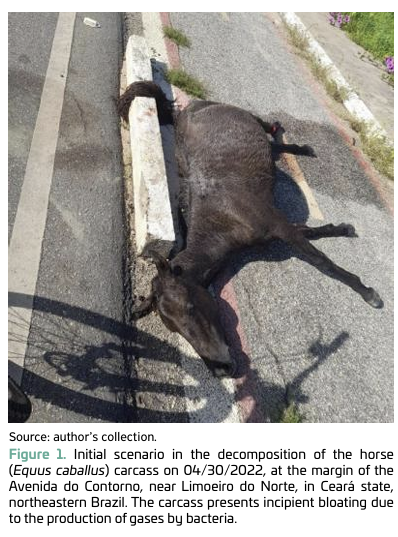Decomposition of Equus caballus roadkilled in the brazilian semi-arid region: temperature and vultures accelerate the decomposition process
DOI:
https://doi.org/10.21708/avb.2024.18.4.12782Resumo
Roads play a vital role in the socioeconomic development of modern society, facilitating the transportation of goods and passengers between different locations. However, they are also a major driver of biodiversity loss, primarily due to the direct impact of animal roadkill. The resulting carcasses from these accidents are a rich source of nutrients for a variety of decomposer organisms, including arthropods, vertebrates, fungi, and bacteria. The decomposition process of a carcass follows a series of distinct stages, influenced by both abiotic and biotic factors such as temperature, humidity, the presence of scavengers, and characteristics of the surrounding vegetation. Scavengers, such as vultures, are essential for nutrient recycling and maintaining environmental health by preventing the proliferation of pathogenic organisms. This case study investigated the decomposition of a horse carcass in a Caatinga environment, observing the presence of invertebrate and vertebrate scavengers. The results indicated that vultures significantly accelerated the decomposition process, leading the carcass to the skeletal decomposition stage in just a few days. Additionally, local environmental factors such as temperature and precipitation played an important role in the decomposition rate. These findings suggest that, in addition to causing biodiversity loss, roadkill can be a valuable resource for scavengers, influencing the dynamics of carcass decomposition and removal.
Downloads

Downloads
Publicado
Edição
Seção
Licença
Copyright (c) 2024 Acta Veterinaria Brasilica

Este trabalho está licenciado sob uma licença Creative Commons Attribution 4.0 International License.
Autores que publicam na Acta Veterinaria Brasilica concordam com os seguintes termos: a) Autores mantém os direitos autorais e concedem à revista o direito de primeira publicação, com o trabalho simultaneamente licenciado sob a Licença Creative Commons Attribution que permite o compartilhamento do trabalho com reconhecimento da autoria e publicação inicial nesta revista. b) Autores têm autorização para assumir contratos adicionais separadamente, para distribuição não-exclusiva da versão do trabalho publicada nesta revista (ex.: publicar em repositório institucional ou como capítulo de livro), com reconhecimento de autoria e publicação inicial nesta revista. c) Autores têm permissão e são estimulados a publicar e distribuir seu trabalho online (ex.: em repositórios institucionais ou na sua página pessoal) a qualquer ponto antes ou durante o processo editorial, já que isso pode gerar alterações produtivas, bem como aumentar o impacto e a citação do trabalho publicado (Veja O Efeito do Acesso Livre).


 Esta obra está licenciada com uma Licença
Esta obra está licenciada com uma Licença 